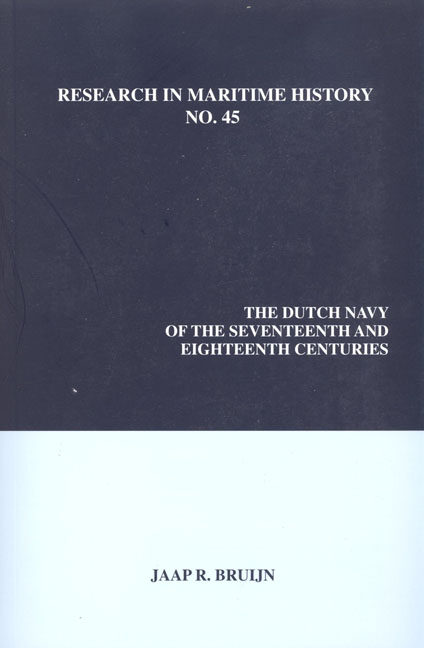Book contents
- Frontmatter
- Contents
- Illustrations
- Tables
- Series Editor's Foreword
- About the Author
- Introduction to the 2011 Edition
- Foreword
- Preface
- Introduction
- Map of the Dutch Republic
- Map of Dutch Naval Activity in European Waters
- Part One The “Old” Navy, Late 1500s-1652
- Naval Operations against Spain and the Dunkirk Privateers
- The Boards of the Admiralties at Work
- The Slow Birth of a Naval Officers' Corps
- Truly International Crews
- Part Two The “New” Navy, 1652-1713
- Part Three A Second-Rate Navy, 1714-1795
- In Retrospect
- Bibliography
- Index
Truly International Crews
from Part One - The “Old” Navy, Late 1500s-1652
- Frontmatter
- Contents
- Illustrations
- Tables
- Series Editor's Foreword
- About the Author
- Introduction to the 2011 Edition
- Foreword
- Preface
- Introduction
- Map of the Dutch Republic
- Map of Dutch Naval Activity in European Waters
- Part One The “Old” Navy, Late 1500s-1652
- Naval Operations against Spain and the Dunkirk Privateers
- The Boards of the Admiralties at Work
- The Slow Birth of a Naval Officers' Corps
- Truly International Crews
- Part Two The “New” Navy, 1652-1713
- Part Three A Second-Rate Navy, 1714-1795
- In Retrospect
- Bibliography
- Index
Summary
The common seaman has always been elusive for historians. Usually, the most one can discover about him are his name, birthplace and monthly wage as registered on the ship's muster roll. Every ship in the merchant marine and the navy had a roll compiled for each voyage, but only a few of those hundreds of thousands of muster rolls from the seventeenth and eighteenth centuries have survived. The admiralties took better care with the so-called “payrolls,” in which the complete financial record on each crew member was kept; many of them from the second half of the eighteenth century still exist. The financial documents of the admiralty of Zeeland's administration have survived in their entirety, providing our sole source of information about the origins and wages of sailors in the “old” navy. Because these sources have not yet been thoroughly studied, a few examples must suffice.
The Zeeland payrolls immediately prove that any idea of a national navy was entirely alien to the Dutch Republic. A naval vessel's crew was invariably a mixture of nationalities, a situation no different from that on board merchant ships. The Dutch Republic was an open society into which immigrants from the surrounding countries were continuously crowding. Expanding maritime and naval activities created a high demand on the labour market, making the seaman's occupation international by its very nature. Even among the Sea Beggars (ca. 1570), the proportion of foreigners was probably twenty-five to thirty percent, mostly Englishmen, Germans and Frenchmen.
Only a handful of people originating from Zeeland had joined the Sea Beggars. More did enlist with their admiralty but never in overwhelming numbers, although its board always spoke in glowing terms of the provincial interest in the navy. From a sample of 422 enlisted men around 1600, only one-third of the petty officers and ordinary seamen were living in Zeeland. The navy must have been very popular among the people of Flushing, for its eighty-seven enlistees formed by far the greatest contingent; the rest of Zeeland had no more than fifty-five. Much larger Middelburg was homeport for only eight. The other six provinces provided seventy-one men, which suggests that just half of the crew were Dutch.
- Type
- Chapter
- Information
- Publisher: Liverpool University PressPrint publication year: 2011



